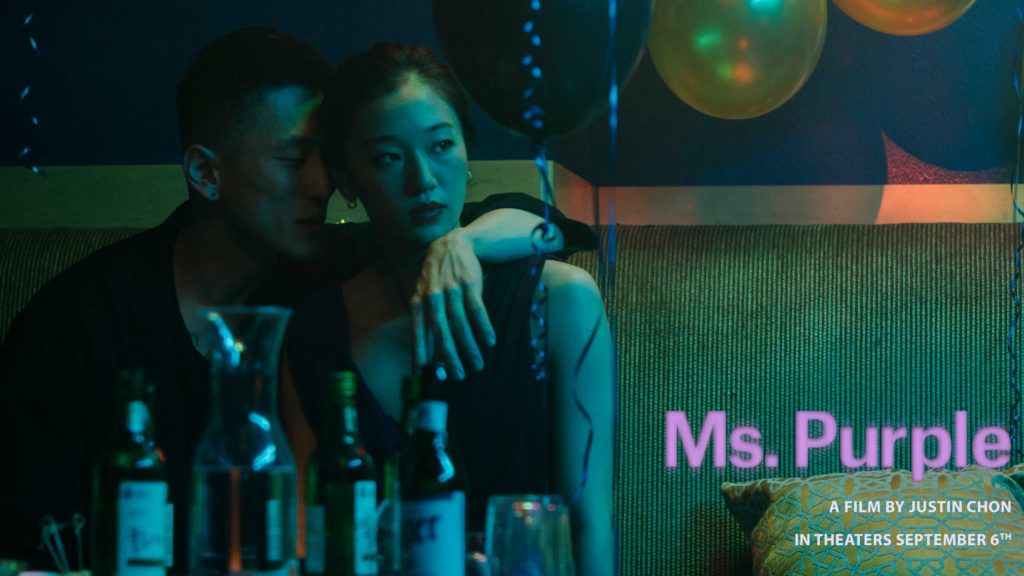
By Jana Monji
(Editor’s Note: Ms. Purple is slowly rolling out across the country after making the rounds on the festival circuit. It opened this weekend in Baltimore, Santa Barbara, Tampa, Houston, Dallas, Plano, Honolulu, Portland, Columbus, Oakland, Las Vegas, Bethel Quad, Washington, San Diego, Cincinnati, and Austin. You can find a full list of cities here.
Tiffany Chu is a rarity, bulldozing through a her undergraduate program in three years at UC Irvine, while making enough connections on her trips up to Los Angeles to end up at Sundance earlier this year as the title character in Justin Chon’s Ms. Purple.
You can chalk that up to Chu’s “work ethic.” Yet life is full of surprises and the screening at Sundance was one of them. Chu recalls, “Both Teddy and I were a little bit surprised because the ending was different than what we shot.” Teddy is Teddy Lee, her on-screen brother. Don’t expect any spoilers here, but don’t expect a happy ending either.
Ms. Purple is about a Korean American woman, Kasie, who becomes a doumi, a karaoke party-girl-for-hire and sometime prostitute. In this #MeToo era, such women only seem to fuel despicable behavior by men. Raised by her father after her mother left, Kasie struggles to pay the bills on her childhood home and to keep her nearly vegetative father alive. When his caregiver leaves, advising her to put him in hospice care, Kasie reaches out of her brother, Carey (Teddy Lee). In a well-worn t-shirt, Carey is unemployed and estranged from both his father and Kasie. Even if he were loving, Carey is not a trained nurse or caregiver and he’s the kind of person who chafes at schedules and restrictions.

Since Sundance, Lee and Chu have been working to promote the film, appearing at panels and giving interviews. Chu views this as an opportunity. Before she got this role she worked on a variety of online web series, film and stage productions and internships. “Most of them were unpaid,” she admits. “Whoever had the opportunity.” She would “just ask if they need any help.” If that seems like old-fashioned advice, the way she learned about the role is not.
She found out about Ms. Purple on Facebook and sent over some pictures. As it turned out, she auditioned with the person who would play her brother, Lee. Lee showed her around Koreatown.
“What really connected the most for me and the Kasie story is coming from the immigrant family,” Chu says. Of course, each Asian American family is different. “Everyone’s connection with their family” but Kasie, like Chu has “her family as her anchor point.”
“Right before filming Ms. Purple, my grandma passed away in Taiwan,” she noted and that “did help to some degree” in fleshing out Kasie’s character and in “staying true to Kasie’s character.” Ultimately Chu thought what was important was how she felt. “I believe in the story; I believe in my work ethic.”
Chu’s family has been very supportive. Born in Taiwan, but raised in Northern California, Chu recalls, “My dad took a lot of pictures of me” and that encouraged her to perform. Yet, her parents weren’t quite clear on what Sundance was. Her parents didn’t make the trip to Utah and hadn’t seen the film until it was at a festival in the San Francisco area.
Since Sundance, many people have come up to her and told her how well this film related to their own experiences with terminal family illness. That’s been both comforting and inspirational. “I am really grateful that the hard work paid off,” Chu said, but also added that after being a #MeToo poster girl in this movie, she’d welcome a role as a badass heroine. With her determination, it’s a definite possibility.
AsAmNews has Asian America in its heart. We’re an all-volunteer effort of dedicated staff and interns. Check out our Twitter feed and Facebook page for more content. Please consider interning, joining our staff or submitting a story

